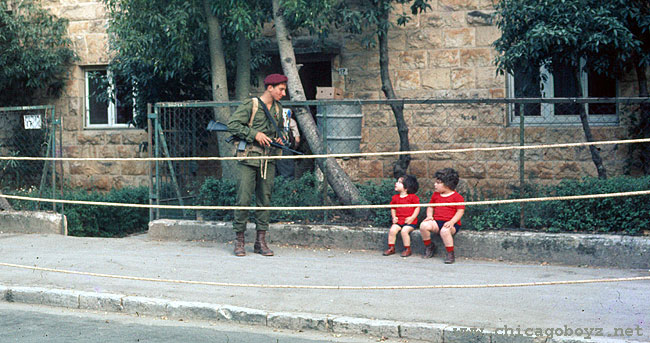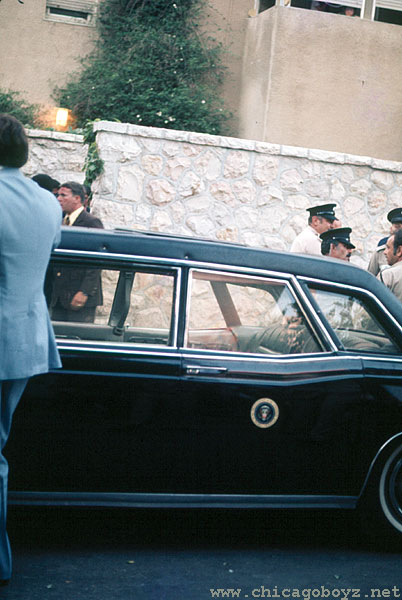I streamlined the permalinks by putting each category of links into its own popup window. This makes it easier to find links by category, but also adds an additional step (you have to click on a category to open the popup menu) to each attempt to open a link. I’d appreciate comments as to whether this new link system is an improvement.
Response From The Independent Institute
David Theroux of The Independent Institute responded via email to my recent critical post about his organization’s position on the war. I reproduce below, with David’s permission, the text of his email response. (We have since exchanged additional emails, so I am posting his response in case other readers want to join the discussion.)
In reference to your recent comment about the Independent Institute
on the Chicago Boyz blog, you may be interested in the following new
article from our quarterly journal, THE INDEPENDENT REVIEW (Spring
2004). Here incidentally is the table of contents for this issue of
the journal:
http://www.independent.org/tii/content/pubs/review/current.html“The Republican Road Not Taken: The Foreign-Policy Vision of Robert
A. Taft,” by Michael T. Hayes (Professor of Political Science,
Colgate University):
http://www.independent.org/tii/content/pubs/review/tir84_hayes.htmlAlso for clarification, the proper term to describe the proposal we
have been making for U.S. foreign policy reform is
“non-interventionism”, not “isolationism.” “Isolationism” was a smear
term originally coined by Wilsonians (“liberal-progressive”
interventionists) to denigrate their opponents (constitutional and
otherwise). The Wilsonian tradition is one of government
interventionism both domestically and internationally, a position
that Robert Higgs and other scholars have shown is inseparably linked
by foreign interventionism (warfarism) being the central
public-choice engine that drives domestic statism
(http://www.independent.org/tii/catalog/cat_crisis.html).In contrast to “non-interventionism,” “isolationism” properly defined
requires a “Closed Door” (or autarchic) policy severely restricting
the free flow of people and trade internationally.Most nation states in the world today maintain a foreign policy of
general non-interventionism based on the tradition of international
law, and many also remain strictly neutral in world affairs while
simultaneously pursuing very active trade, travel, cultural, and
other exchanges. Meanwhile, almost alone among nations today, the
U.S. government pursues a deliberate policy of preemptive covert and
overt interventionism, and many scholars now consider such policies a
major cause of economic and political instability and hardship,
upheaval, and terrorism.Attempts by the U.S. or any government to centrally plan and impose
rule over people is exactly what classical liberals and libertarians
have historically opposed. Non-interventionism is the traditional
policy of the U.S. as a republic as described by Washington, Madison,
Jefferson, and other Founders, based on the simple ethical and legal
position that aggression against innocent, peaceful people is wrong
and a rule of law should be applied universally to prohibit it. For
your review, here is a web page with references that seriously
discuss non-interventionism:
http://www.onpower.org/foreign_non_inter.htmlFurther information on our program in this regard can be found via
our Center on Peace & Liberty:
http://www.independent.org/copalPlease advise me with any questions.
The Independent Institute’s Counterproductive Email List
Like Steven Den Beste, I also received (note past tense) regular copies of David Theroux’s “would you please post a notice” emails, as I’m sure did numerous other bloggers. I had a more favorable impression of The Independent Institute before I started receiving these emails. It seemed that nearly every issue of the Institute’s online newsletter contained at least one article from the why-do-they-hate-us school of libertarian isolationism. This eventually got under my skin and I asked to be removed from the list. Theroux et al are entitled to their opinions, but they aren’t doing the libertarian cause any favors by associating it with opposition to the war against fundamentalist Islam. There is no contradiction between libertarianism and defending an imperfect liberal society against totalitarian aggression.
Mortgages come to Russia
Good article about the burgeoning mortgage market in Russia.
“While the learning curve has been steep, analysts say the post-World War II example of the US – where government-backed credits, loans, and mortgages for GIs transformed the American economy for decades – is a lesson for the Kremlin.
“It’s a huge effect [on] releasing spending power into the economy,” says Gaige of Ernst & Young. In the past, “the money people needed to buy a house would have been taken out of the economy … and their spending power would have been reduced” before and after the purchase by the effort to collect that money.”
Wish I could participate. The only thing worse is watching VIP go from 56 to 100 and not holding any shares…
Views From The Past
I’m feeling kind of blogged out and decided to post something different. I’ve been going through a batch of family photos that no one has looked at in years. It’s like a time capsule. A few of the pictures may be of general interest. I really like the ones below. A relative of mine made them when President Nixon visited Jerusalem in 1974.

Parade route with Monastery of the Cross in background.

I don’t know where this was. It may have been across the street from the prime minister’s residence.

Outside the prime minister’s residence.